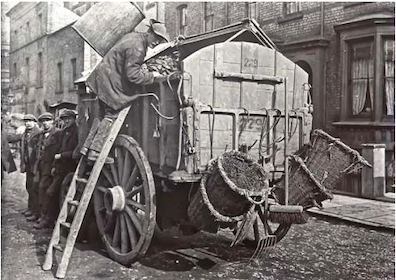Contemplating the approach of middle age, the nearly
34-year-old Molly thinks of the unequal implications for men
and women: "its all very fine for them but as for being a
woman as soon as youre old they might as well throw you out in
the bottom of the ashpit." The bitterness of her reflection
appears in her choice of image: ashpits were holes in the back
gardens of houses where fireplace ashes were dumped, along
with other sorts of household waste.
Ashpits were brick- or concrete-lined holes for storing the
ashes from household fires. Workers called dustmen
periodically hauled away the ashes, which were used either as
fertilizer or in the manufacture of bricks. But people also
used these open pits as trash dumps, and it seems likely that
they often received kitchen waste and the contents of
chamberpots. Joyce emphasizes their foul smells. In "Araby"
the narrator associates the odors of ashpits with those of
lanes and stables fouled with horse shit: "The career of our
play brought us through the dark muddy lanes behind the houses
where we ran the gauntlet of the rough tribes from the
cottages, to the back doors of the dark dripping gardens
where odours arose from the ashpits, to the dark odorous
stables where a coachman smoothed and combed the horse or
shook music from the buckled harness." (The "muddy lanes" and
"foul lanes" in Joyce's fiction are alleys where street
sweepers have not removed the piles of horse excrement.)
When Joyce was struggling with London publisher Grant
Richards' objections to various kinds of perceived filth in Dubliners,
he cited the rank odors of household waste dumps as emblematic
of his book's uncompromising realism: "It is not my fault that
the odour of ashpits and old weeds and offal hangs round my
stories. I seriously believe that you will retard the
course of civilisation in Ireland by preventing the Irish
people from having one good look at themselves in my nicely
polished looking-glass.” Molly's reference to ashpits at the
end of Ulysses can be read as a retrospective glance
at this dank olfactory realism in the collection of stories.
The novel rescues its protagonists to some extent from the
paralysis and futility foregrounded in the stories, and Molly
regards her sexual attractiveness as her best hope of being
something better than trash. Being thrown out in the soggy,
festering "bottom of the ashpit" vividly conveys the
loss of dignity that she fears.
In an informative blog
(peterchrisp.blogspot.com/2022/11/james-joyces-ashpit.html),
Peter Chrisp reports on the 2013 excavation of an ashpit
behind the house at 8 Royal Terrace, Fairview, where the
Joyce family lived in 1900 and 1901. The dig turned up more
than 250 magic lantern slides on religious subjects which
appear to have belonged to a Presbyterian lay preacher who
lived in the house from 1918 until his death in 1921. (The
slides were probably dumped there after his death.) Chrisp
notes a remarkable coincidence: according to Stanislaus Joyce,
in 1901 the Joyce family discovered two books in that ashpit,
one of them a bound copy of the four gospels that presumably
belonged to the Protestant family that had been there before
them (My Brother's Keeper, 113-14). Biographers Jackson
and Costello remark that "The splendour of the trove may have
been the origin of another of John Stanislaus Joyce's sardonic
catchphrases when anything was in short supply: 'Have you
tried the ash-pit?'" (John Stanislaus Joyce, 227).
There are intriguing connections here to the midden in Finnegans
Wake where Biddy the hen pokes about and discovers the
buried letter. A midden, Chrisp notes, "is an archaeological
term for a mound of domestic refuse, often food remains
(kitchen middens)." At one point in the Wake it is called "the
orangeflavoured mudmound" (111). Joyce's fiction makes little
distinction between such piles of damp, rotting organic matter
and pits of fireplace ash. Presumably they sat next to one
another in people's gardens or were simply mixed together.
Chrisp quotes from a description of the lane behind Royal
Terrace in part 5 of A Portrait of the Artist: "'The
lane behind the terrace was waterlogged and as he went down it
slowly, choosing his steps amid heaps of wet rubbish, he heard
a mad nun screeching in the nuns’ madhouse beyond the wall....
He shook the sound out of his ears by an angry toss of his
head and hurried on, stumbling through the mouldering offal,
his heart already bitten by an ache of loathing and
bitterness."

